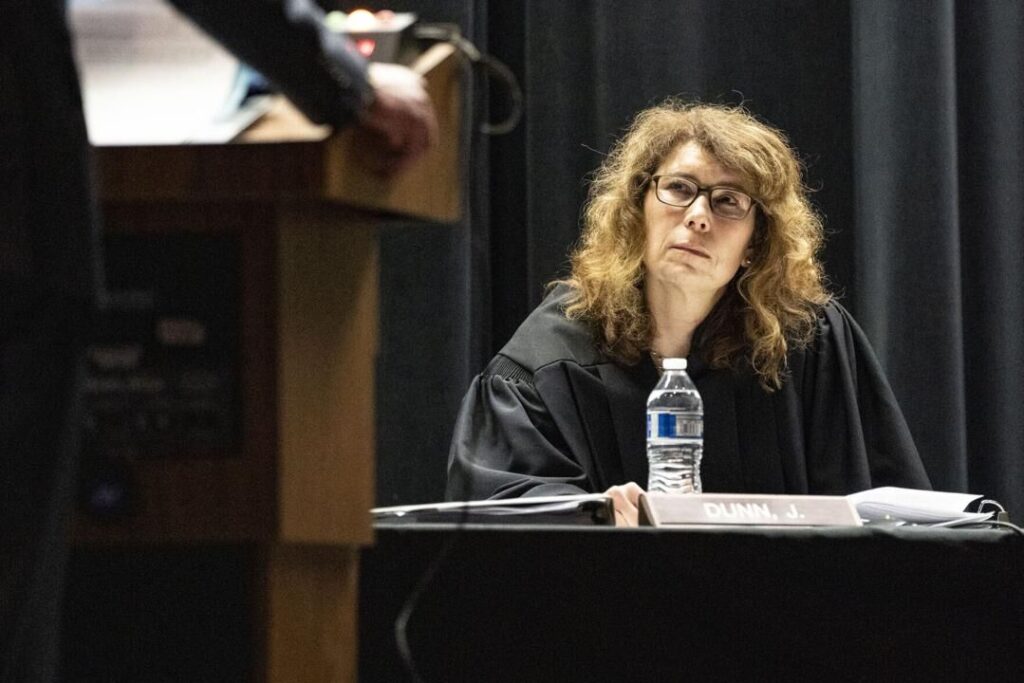Colorado Supreme Court to hear medical malpractice, murder appeals

The Colorado Supreme Court on Monday agreed to hear two appeals questioning whether a judge should look at slashing a $9 million jury verdict for a botched surgery down to just $1 million, and whether a man convicted of murder and drug offenses received a fair trial.
At least three of the court’s seven members must consent to hear a case on appeal.
The justices also showed interest in a third case out of Denver that asks whether healthcare providers have immunity for reporting potential drug crimes to authorities, even if the allegations go nowhere.
The malpractice lawsuit
Daniel B. Scholle underwent surgery in 2015 at Sky Ridge Medical Center. A series of missteps and complications resulted in significant bleeding, cardiac arrest, a severe infection and 100 days spent in the intensive care unit.
Scholle sued his two doctors, Edward Ehrichs and Michael Rauzzino, and the hospital operator, HCA-HealthONE, for negligence. After a five-week trial, a Denver jury sided with Scholle and awarded him nearly $9.3 million for past and future medical expenses, plus Scholle’s lost income.
Because the state’s Health Care Availability Act limits damages in medical malpractice lawsuits to $1 million, Scholle had to show there was “good cause” to exceed that cap. Then-District Court Judge Robert L. McGahey Jr. easily found there was reason to do so.
“As a result of those injuries, Mr. Scholle will never work again, but can expect to see escalating medical costs through the remainder of his life,” McGahey wrote in January 2020.
However, a three-judge panel for the Court of Appeals partially disagreed. It did not dispute the seriousness of Scholle’s injuries and the high medical costs he incurred. Instead, the panel found McGahey did not consider whether Scholle actually owed money to his insurer. Although McGahey could not reduce the jury’s verdict solely because Scholle owed nothing further, it was nonetheless a relevant consideration.
“Contrary to one of the trial court’s findings,” wrote Judge John Daniel Dailey for the panel’s majority, “Scholle did not produce any evidence that he owed any money to third-party payers or providers.”
Then-Judge Michael H. Berger disagreed with that conclusion. The law prohibits reductions to jury verdicts if an injured person has been compensated “as a result of a contract.” Berger believed it improper to overturn the $9.3 million judgment simply because Scholle’s insurance may have paid the medical bill, as it was contracted to do.
Scholle, who died during the appeal and whose widow has taken his place in the lawsuit, appealed the panel’s decision. The Supreme Court has agreed to examine whether the Court of Appeals correctly returned the case to the trial court to consider whether good cause still existed to exceed the damage cap in light of Scholle’s insurance payments.
The case is Scholle v. Ehrichs et al.
The barbeque slaying
In August 2017, Joseph Wayne Washington attended a barbeque in Cherry Creek State Park. Another attendee, Jackson Chavez, began a physical altercation and Washington retrieved a gun and shot him. Washington left the park and police arrested him the following day for Chavez’s killing. Law enforcement discovered narcotics in Washington’s car and his home.
Arapahoe County prosecutors charged Washington with first-degree murder and nearly one dozen drug offenses. Washington requested separate trials for the different types of charges, but the judge refused on the grounds that Washington’s offenses were “all interrelated and interconnected.”
Jurors convicted Washington of second-degree murder, 10 drug charges and witness tampering. He received a sentence of 58 years in prison.
He then appealed, arguing his offenses were wrongly joined in a single trial. A panel for the Court of Appeals decided any potential mistake would prompt a reversal of Washington’s convictions only if it impaired Washington’s right to a fair trial. Based on the “overwhelming” evidence of guilt, the panel found such an error, if one existed, did not affect Washington’s conviction.
Washington again appealed to the Supreme Court, arguing that allowing jurors to hear evidence of his drug crimes could have made them more likely to believe he murdered Chavez without justification.
It was reasonable, wrote public defender John Plimpton, “that the jury’s evaluation of Washington’s self-defense claim was influenced by the copious evidence that he was a prodigious drug dealer and thus had a criminal character, particularly where the jury’s consideration of the drug evidence was not limited in any way.”
The Supreme Court has agreed to review the Court of Appeals’ conclusion. It will also address whether the panel correctly interpreted Supreme Court precedent in reaching its decision.
The case is Washington v. People.
An investigation into opioids
Finally, the Supreme Court indicated it could intervene in a hospice worker’s lawsuit against her former employer.
Tana Edwards of Denver worked for New Century Hospice, Inc. as a registered nurse. In mid-2019, she transferred positions but still continued to care for an existing patient with New Century’s Castle Rock location. Several months later, operations director Kathleen Johnson reportedly discovered the patient was receiving prescriptions of Oxycodone pills far in excess of what the patient required.
Johnson initiated an investigation. She took inventory of the medications in the patient’s home and found 465 Oxycodone pills were missing. Based on the suspicion that Edwards had diverted the painkillers for illicit reasons, New Century reported her to the police, the state health department and the Colorado Board of Nursing.
Eventually, the entities would drop their inquiry and no further action was taken against Edwards’ nursing license.
Edwards then filed suit against New Century and Johnson, alleging the investigation was unprofessional and reckless.
In December 2022, Denver District Court Judge Mark T. Bailey dismissed most of Edwards’ allegations. He did, however, permit one claim to go to trial: that New Century was negligent in its supervision of Johnson.
“The consequences of incorrect reporting are serious and, as demonstrated by this case, may include a criminal investigation, suspension of a nurse’s license, interference with patient relationships, and embarrassment and anxiety for the reported individual,” Bailey wrote.
The judge also found New Century was not entitled to immunity under the state’s required reporting laws, reasoning only “persons” could be immune. The hospice provider then appealed to the Supreme Court.
New Century is “on the verge of an even more expensive trial simply because it did what it was required to do – it reported one of its nurses for suspected drug diversion,” wrote attorneys for the company.
They elaborated that Bailey’s denial of immunity would discourage healthcare companies from reporting suspicious drug activity to authorities. New Century argued the chilling effect would be devastating to the state’s efforts to combat skyrocketing drug overdoses.
“One of the many solutions Colorado employed to curb this crisis was to impose mandates on healthcare providers to report any suspected diversion of prescription drugs,” wrote New Century’s lawyers. “To better ensure that suspected diversion is reported and to quelch any risk for reporting diversion … the Colorado Legislature granted healthcare providers immunity for making these reports.”
The Supreme Court directed Edwards to explain why it should not reverse Bailey’s ruling denying immunity to New Century.
The case is Edwards v. New Century Hospice, Inc. et al.














